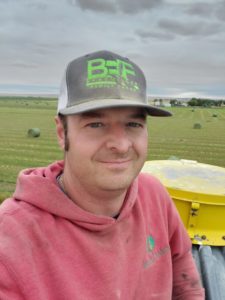
Growing up in rural Alberta, discussions about mental health were never a part of Sean Stanford’s life.
“Farmers are usually the kind of people who don’t talk about their feelings,” shares the 36-year old grain farmer, who lives and works near the town of Magrath, a community south of Lethbridge.
“They’re usually [straight]-to-the-point hard workers, and there’s no time for that kind of [stuff],” he says, reflecting on his experiences as a farmer and someone who personally deals with mental illness. “That’s kind of the way it’s always been, and I never thought of it any differently.”
Stanford’s view of mental health shifted over the years as he got older and the demands of his career and lifestyle started to weigh on him more and more.
Getting help, the right kind of help, was important, and my doctor was a huge part of that.”
-Sean Stanford, Southern Alberta farmer
“Farming is tough,” he says. “It’s not an easy career for anyone to choose. It’s not an easy lifestyle; you live where you work, 24/7. Work is always on your mind.”
According to a 2016 study from the University of Guelph, farmers can be among the most vulnerable Canadians when it comes to mental health, with 60 percent of the study’s respondents reporting experiences with anxiety, 35 percent facing depression, and 45 percent identifying high stress.
“For me, it wasn’t a good harvest the year before and money was tight,” says Stanford. “There were lots of bills to pay and I have a young family so that was stressful too.”
“It was kind of a perfect storm,” he explains of 2016 when he started to experience serious signs of emotional distress.
Prior to this, Stanford says his only experiences with mental health were occasional bouts of anxiety, something he didn’t truly understand until it sent him to the emergency room.
Men need to realize that they’re human too … [R]eaching out for help isn’t a bad thing. Trying to go through some of these things by yourself is nearly impossible. It’s no different than having a stroke and then thinking you can get through that by yourself.”
– Sean Stanford, Southern Alberta farmer
“I had a total breakdown, a major anxiety attack. I ended up going to the hospital multiple times over the course of a week to see doctors because I thought I was having a heart attack. That’s how it presented itself in my body, with physical pain.”
Today, Stanford says he can look back on his life, using the tools he’s learned over the last three years, and see how mental illness has been a part of his life for much longer than he realized.
“I’ve had anxiety probably since I was a teenager, but it never came to light or was never diagnosed,” he shares. “Until three years ago, I never really thought about it, but once I was diagnosed [with depression and anxiety] I started looking back and [recognized] I’ve been like this my whole life.”
Stanford says he currently has more good days than bad. Had he not sought help from his doctor, he’s unsure of where his health would be.
“I’m glad I got help right away,” says Stanford. “If I [hadn’t] I don’t know how things would have turned out. I might’ve still been struggling, worse than I am right now. Getting help, the right kind of help, was important, and my doctor was a huge part of that,” he adds.
Stanford says being his own advocate was key in seeking support and that he’s had to be determined to make his mental health a priority and find someone who he felt understood him and his life.
“It’s been quite a journey to get to where I am, and it’s been three and a half years,” he explains of his path to find the right kind of support. “It wasn’t a quick thing [by] any means… I just about gave up a couple of times, but when I did find the right match, it was a huge relief.
“So, if you’re going to look for [support], don’t give up,” he advises.
Verbalizing and discussing his experiences with others who suffer from mental health issues has also helped him look at things differently, no matter how many times he talks about the subject.
“Men need to [recognize] that they’re human too,” he says, urging men to speak out, even to just one person. “Reaching out for help isn’t a bad thing. Trying to go through some of these things by yourself is nearly impossible. It’s no different than having a stroke and then thinking you can get through that by yourself.”
Stanford’s life has taken an unexpected twist over the last couple of years, but it’s a journey he’s willing to pursue in order to help others and break the stigma.
“It’s been really awesome, but it was definitely a whirlwind,” he says of speaking with the media, sitting on discussion panels, and talking to the Standing Committee on Agriculture and Agri-Food at the House of Commons. “I’m glad to do it. All I want to do is show others that, if they’re struggling, it’s okay to talk about it.
“Don’t feel like you need to fight this battle by yourself.”
To learn more about men’s mental health or how to reach out to someone who’s struggling, visit- www.suicideinfo.ca/resource/men-and-suicide/ or https://alberta.cmha.ca/news/men-mental-health-how-to-start-the-conversation-about-your-mental-health/ or https://www.domore.ag/
-Lesley Allan
Did you enjoy this article?
Subscribe to the Rural Health Beat to get a positive article about rural health delivered to your inbox each week.
Oops! We could not locate your form.
